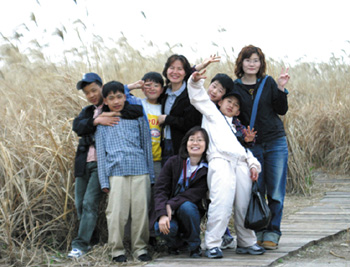
Shim is a representative of Bal-gul-eum ("footsteps" in English), an Ewhaian volunteer tutors" club that teaches "freedom immigrant" children from
North Korea (Shim and other Bal-gul-eum members refer to North Korean escapees this way because they believe this is a phrase that avoids negative connotations about the immigrants social status). Hanwoori School is an after school study program designed for these children, aged from 10 to 15, who need extra help in adapting to the South Korean curriculum.
Since the school"s opening in March, each member of "Bal-gul-eum" visits the school once a week to teach English, mathematics, and science. Hanwoori School is located in Sinjeong-dong, Yangcheon-gu where many families of freedom immigrants settle down.
Shim says of her reasons for visiting Hanwoori School: "When we visited each home and taught students one-on-one, the activity was disorganized and members could barely meet.Also,we all needed help with how to deal with problems occurring during the tutoring sessions, for example, how to begin conversations with North Korean kids. But now we do not need to worry because we have a counselor - a teacher at Hanwoori School. She studies North Korean affairs while helping the children and she is a big help."
Tutoring pupils who grew up in a different culture seems hard.However, "Bal-gul-eum" members find it interesting because they can learn directly about the North by interacting with people who have actually lived there.
Another tutor in "Bal-gul-eum," Park Sung-hyo (Division of Humanities and Foreign Languages &Literatures,1) says, "I learned not to ask about the children"s private lives,but that doesn mean there is no chance to learn about their lives in North Korea. Though I do not bother them or force them to talk about their own lives,they tend to talk to me first." Shim agrees with Park, "What I"ve learned about North Korean culture is that the people are very logical. The kids always say "because" to explain their reasons after giving opinions."
However, freedom immigrant children have been hurt both mentally and physically many times during their journey to the South and their experiences have taught them not to reveal their feelings easily. Wounded hearts can also make these children rough mannered. "The children cannot easily trust others, especially people who ask them questions. I heard that each North Korean immigrant gets interviewed more than
200 times and that makes the North Koreans feel sick of being questioned. They rarely look into a stranger"s eyes," says Shim.
Even though tutors including Shim volunteer because of goodwill, sometimes they face indifference and criticism from other people. Shim says, "People ask us "Why tutoring? There are many other ways to help freedom immigrants." People seem to think that freedom immigrants only need the necessities of life, such as food, clothes or places to live in."
It is true that living necessities are foremost while the immigrants adjust to Korean society; however, economic hardship is not the only obstacle that the newcomers have to face.Shim explains, "Usually, the freedom immigrant children suffer unimaginable agony and terror during their journey of escape. Being exposed to strange situations for many years, speaking Korean with a different accent,and more importantly not being able to understand the many English words used in South Korea cause them to feel isolated.In addition to all this, classroom culture bothers the
children. As small kids lack understanding, many South Korean classmates make fun of them and even ignore them in school."
Shim compares the freedom immigrant children"s situation to that of fresh-off-the-boat immigrants to the U.S. who cannot speak English at all.?"The suffering they experience here - differences in curriculum, South Koreans" attitude towards them, and loneliness - are just as tough or even more so than those of foreigners in the U.S.
At the moment, "Bal-gul-eum" is waiting for new members, people with warm, tender hearts who can understand and help the freedom immigrant children. When asked about qualifications, Shim says softly but firmly, "Any Ewhaian who can work long-term as a tutoring volunteer is welcome. It is easy to begin but hard to continue. But, anyone with a true caring heart to offer the freedom immigrants, please come and be a member.
"Bal-gul-eum" plans to register as a formal club at Ewha at the end of this semester.
happydream83@ewha.ac.kr

